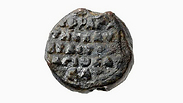
800-year-old lead seal found in Jerusalem
Excavations in Bayit VeGan neighborhood uncover unique seal of Monastery of St. Sabas; find presented to Greek Orthodox patriarch, who notes its importance for history of Christianity.
An 800 year old rare seal was unearthed during excavations in the Bayit VeGan quarter in Jerusalem. The artifact, discovered at an antiquities site a year and a half ago, was only recently identified as a unique seal only after the excavation finds were processed and studied, a press release issued by the Israel Antiques Authority (IAA) said.
During the summer of 2012, the IAA executed two archeological salvage excavations at the "Horbat Mizmil" antiquities site. The digs revealed remains of a farmstead constructed during the Byzantine period (fifth–sixth centuries CE). Over the years, the site was abandoned and resettled several times, until it reached its maximum size during the Mamluk period period (thirteenth–fifteenth centuries CE).

The seal is in excellent condition. One of its sides shows the figure of St. Sabas, or according to his Syriac name, Mar Saba, holding a cross in his right hand. Its other side features a Greek inscription with the words "This is the seal of the Laura of the Holy Sabas".
St. Sabas was one of the most important leaders of the Christian monastic movement developing in the Judean desert during the Byzantine period. He was the founder of several monestaries, including the "Great Laura", referred to today as the "Monastery of St. Sabas".
The structure, situated on a cliff overlooking Nahal Kidron, is the only monastery in the Judean desert that has been continuously inhabited since its establishment, and today there are some 10 monks belonging to the Greek Orthodox Church who reside there.
.
Dr. Yuval Baruch, the IAA's regional archeologist responsible for Jerusalem, presented the find to the Greek Orthodox Patriarch of Jerusalem, who noted its importance for the history of Christianity in the Holy Land.
"This is an extraordinarily rare find because no such seal has ever been discovered to date," said excavation directors Benyamin Storchan and Dr. Benyamin Dolinka.
"Also, the object possibly contributes important historical information about the surroundings of the site in the Bayit VeGan neighborhood," they added.










